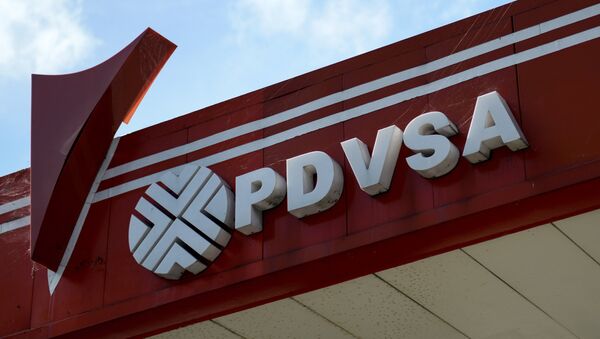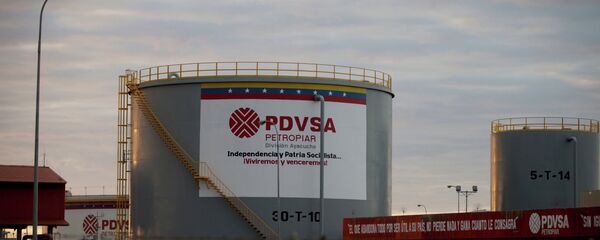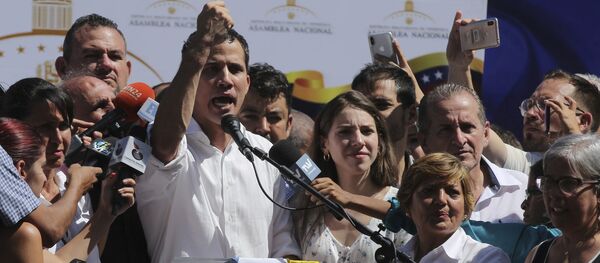The United States has made another attempt to choke off oil-rich, cash-poor Venezuela, having slapped sanctions on the state-owned oil company PDVSA.
READ MORE: All Venezuelan Diplomats Have Returned From US to Caracas — Maduro
In light of Washington's continuing efforts to pressure President Nicolas Maduro into stepping aside in favour of self-proclaimed interim president Juan Guaido, here are some key facts about Venezuela's oil and gas giant, sanctioned by the US, and the energy sector as a whole.
State-Owned Oil Monopoly
Back in 1976, under the presidency of Carlos Andres Perez, the oil industry was officially nationalised, and all foreign companies were replaced by Venezuelan firms, which, in turn, were later absorbed by the newly-created Petróleos de Venezuela (PDVSA).
READ MORE: US Violates All Norms of International Law in Situation With Venezuela — Lavrov
Over a 25-year span, the state-run company became the biggest oil and gas firm in the region, and dominated the industry of the Latin American country, which has the largest oil reserves in the world.
At the beginning of the new millennium, Venezuela was the world's fifth largest exporter of crude oil, with oil accounting for 85 percent of the country's exports.
In order to gain greater state control over the oil industry, the Chavez government raised royalty taxes on oil firms and introduced the formation of "mixed companies", under which the PDVSA could have joint control with private companies over the industry.
In 2002, almost half of PDVSA employees went on strike to pressure Chavez to call snap elections, which couldn't help but halt oil production for two months before the government managed to restore control over the oil giant. The authorities sacked an estimated 40 percent of the workforce — 18,000 people — which also affected the oil industry as a whole since the government struggled to replace the fired staff.
READ MORE: Caracas Accuses Lima Group of Supporting Corruption, Dubs 'The Lima Cartel'
Despite the pressure on Chavez and fierce opposition to his policies, by 2006 PDVSA had attained at least 51 percent control of all of the 32 accords inked with private companies in the 1990s.
US Processes Venezuelan Crude
According to Bloomberg, refiners in Louisiana and Texas would be greatly affected by the recently-announced sanctions, and the hardest-hit would be PDVSA's US-based refining arm, Citgo Petroleum Corp., which is Caracas's main source of foreign income.
Venezuela exports some 500,000 barrels of oil to the US, mostly to Citgo and refineries owned by Valero Energy Corp and Chevron Corp; Citgo imported the most Venezuelan crude oil in the first ten months of 2018, followed by Texas-based Valero and California-based Chevron.
“They are not allowing tankers bound for Valero, Citgo and Chevron to leave Venezuelan ports if not prepaid”, a PDVSA source told Reuters.
Foreign Investments in Oil Sector
Although the US is the largest importer of Venezuelan oil, Treasury Secretary Mnuchin estimated that the ban would have "very modest impacts on the US refineries".
READ MORE: Beijing Blasts New US Sanctions on Venezuela, Will Keep Cooperating With Caracas
However, the newly-announced sanctions may jeopardise foreign investments in Venezuela's oil industry, including those from China, Russia and India.
Russia, for its part, has given Venezuela $17 billion in loans and investments, and in December 2018 the two governments clinched a new deal in which Moscow will invest $6 billion in Caracas’s oil and gold sectors.
India also continues to be one of the main buyers of Caracas's crude despite the ongoing political crisis in the country. Financial Express cited diplomatic sources as saying that Indian companies purchase over 400,000 barrels of oil per day.
Privileges for US Allies?
During a press conference on Monday, Mnuchin revealed that some countries may obtain some sort of waivers to adjust to the situation, although he did not provide any details:
"We have also issued general licenses to ensure that certain European and Caribbean countries can make an orderly transition", he said.
READ MORE: Venezuelan Opposition Leader Guaido Says Had Conversation With Trump
In addition, US companies will be allowed to continue to purchase Venezuelan oil, but the payments must be held in an account that cannot be accessed by the Maduro government.
"If the people in Venezuela want to continue to sell us oil, as long as that money goes into blocked accounts, we'll continue to take it. Otherwise we will not be buying it", Mnuchin noted.
Simmering US-Venezuela Tensions
US National Security Adviser John Bolton and Treasury Secretary Steven Mnuchin announced on Monday that the US had blocked all of PDVSA's assets under its jurisdiction and banned deals with the company. Bolton also stated that Washington was freezing $7 billion worth of PDVSA's assets, while another $11 billion will be lost in terms of oil deliveries.
READ MORE: 'Hands off Venezuela, Immediately!' WATCH Maduro Address Trump in English
While Maduro has accused the US of orchestrating a coup by recognising self-proclaimed interim president Juan Guaido as the legitimate head of the country, this is not the first time that Washington has suggested that political change in Venezuela would be "easiest" if Maduro chose to step aside.
Last February, then-Secretary of State Rex Tillerson, who used to be the CEO ExxonMobil, floated a potential military coup in Venezuela.
"In the history of Venezuela and South American countries, it is often times that the military is the agent of change when things are so bad and the leadership can no longer serve the people. I think there will be a change. We want it to be a peaceful change. Peaceful transitions, peaceful regime change, is always better than the alternative".
Guaido has been recognised as Venezuela's interim president by a host of South American countries, the US, Canada, and Israel, while a number of European nations have announced their intention to follow suit. In the meantime, Russia, China, Turkey, Cuba, Bolivia, Iran, El Salvador, and Nicaragua are supporting the legitimately elected Maduro.







